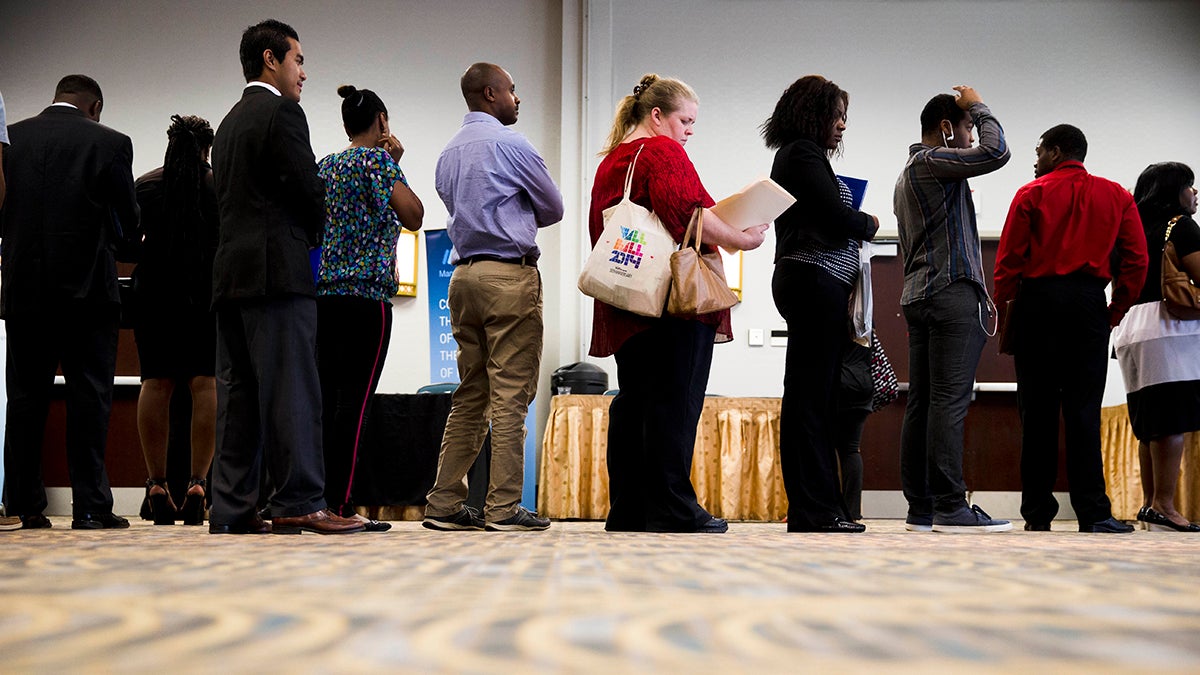Pay for Success sounds straightforward, but getting it right may take a while

People wait to meet recruiters at a Philadelphia job fair in June 2014. Job preparedness and employment was one of the five areas Governor Wolf’s administration identified that could benefit from Pay for Success performance contracts. (AP Photo/Matt Rourke)
Using a very specific public-private partnership model to improve social service outcomes in Pa.
In 2015, the Harvard Kennedy School decided to support Pennsylvania in creating Pay for Success programs. If Pay for Success sounds like bribing a middle schooler to bring home good grades ($5 for an A, anyone?) it’s because both transactions aim to incentivize results. The former is just more involved than the latter.
Pay for Success contracts are a fairly new idea. The first U.S. program launched in New York in 2012. They’re also known as social impact bonds. Whatever you call them, a Pay for Success contract is essentially a loan from the private sector to government in service of the public good. Pennsylvania identified five areas of focus: early childhood care and education; education, workforce preparedness, and employment; public safety; health and human services; and long-term living and home- and community-based services.
Here’s how it works: a funder agrees to pay a service provider for their work, whether that’s preparing children for kindergarten, connecting adults with steady jobs, or reducing prison populations. If the service provider meets the negotiated benchmarks for success, for example, a drop in recidivism, then the government pays the funder back with interest. They can afford to do that because they’re saving money on housing prisoners.
Pennsylvania’s two Pay for Success programs will both roll out in 2017. One will help adult parolees in Allegheny, Dauphin, and Philadelphia Counties find and keep jobs. The other will provide support to juveniles in the justice system. Developing the two programs as public-private partnerships isn’t more difficult than creating other programs, just different, said Jeff Sheridan, Governor Wolf’s press secretary.
“There’s a lot that goes into that rather than just, for example, the Department of Corrections carrying out a program that was funded by the budget.”
From a budget standpoint, the value is pretty straightforward, he said.
“The state does not pay if the program does not work.”
While investors could lose their collective shirt if a program doesn’t create measurable outcomes, the government gets to walk away.
Theoretically, though, everyone wins: service providers have long-term commitments from funders to do good work; funders get to invest their money in programs they believe in; the government saves money and serves people in need; and people in need get tangible, effective help. And all of the decisionmaking relies on evidence.
While it’s good to reward effective work, particularly since budgets are limited and lots of people need help, proving that societal change translates into financial savings every time can be tricky. In an article for the Stanford Social Innovation Review, V. Kasturi Rangan and Lisa A. Chase write that Pay for Success could be detrimental to the very populations that governments, funders, and service providers are trying to help.
It will be a while until Pennsylvania can gauge the success of Pay for Success. But the state, as well as the Harvard Kennedy School, the Corporation for National and Community Service Social Innovation Fund and the Pritzker Children’s Initiative, has invested a lot of time in trying to get this first round right: design and development for the two programs has been ongoing since January 2016.
WHYY is your source for fact-based, in-depth journalism and information. As a nonprofit organization, we rely on financial support from readers like you. Please give today.


